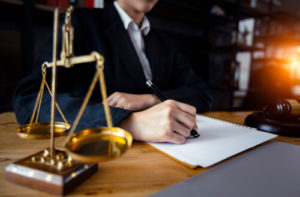The Three Institutions Which Make up the American Criminal Justice System

A criminal defence lawyer will tell you that three major institutions make up our American criminal justice system. These three institutions are law enforcement, the court system and corrections. The rights of the accused and convicted are, in theory, protected during each state of the process. The Miranda advisement as well as the Fourth Amendment prohibit law enforcement from being overzealous in their search for justice. Overreaching and abuses of the law are ostensibly prohibited under our system, including the execution of unreasonable searches and seizures. This stops police officers from searching a suspect, his home or his vehicle without a warrant—except when extenuating circumstances are present.
The court system is also bound by certain restrictions when prosecuting a case. To name a few, defendants have the right to confront their accuser, the right against self-incrimination, the right to legal counsel and the right to a jury trial. The goal of these rights given to defendants is a fair trial. The United States corrections system administers probation, incarceration, or a combination of both. Supervised or unsupervised probation may be ordered, and incarceration is the most common outcome for the more serious criminal offense convictions. Jails are usually located in counties that are reserved for less serious offenders. Prisons are state institutions, usually, and almost always involve a sentence of more than a year and a serious felony offense.
Stages of Florida Criminal Charges
- If the police suspect you are involved in a criminal activity, an investigation will take place. During this investigation, law enforcement will do their best to amass evidence against you, with a goal of a conviction.
- Witness interviews will be conducted, and if the police feel there is sufficient evidence, you may be arrested.
- You will appear for your bond hearing, and should bail be denied, you could be forced to remain in jail.
- You will appear for your arraignment, during which you will enter a plea of not guilty.
- Next, you will be required to go before a judge for your preliminary hearing.
- The prosecutor must show there is ample evidence to warrant a trial during this preliminary hearing.
- If the prosecutor meets that burden, a plea bargain may be offered. A plea bargain generally offers to reduce the charges, drop some of many charges, or agrees to a lesser sentence in return for your guilty plea.
- If a plea bargain is not offered—or accepted—your case will be bound over for trial.
While this is the “general” sequence of events, there are other scenarios. Your criminal investigation could end with no arrest. You could be arrested and charged, then later have those charges dismissed due to illegally seized evidence or other mistakes made by the police. You could enter a plea bargain and receive a much lighter sentence.
You could go through the trial and be acquitted of the crime you were accused of. Obviously, the worst-case scenario is a conviction by a jury and a long prison sentence. The outcome of your particular criminal case can depend on a number of factors, including the crime being charged, the strength of the evidence, whether proper procedures were followed by law enforcement, the experience and knowledge of your criminal defence lawyer and the goals and strategy of the government.
Legal Action
If you are up against criminal charges, you need an aggressive criminal defence lawyer in your corner. Such lawyers can be found in a local law firm such as Tuttle Law P.A. Seek legal action today.






